
Research from the Heartmath Institute
Another part of our interconnectivity research is measuring the electrical activity of trees and, more generally, the ground. We have spent the past couple of years researching and developing reliable methods and equipment to measure tree potentials, and recently, we also began measuring ground potentials.
Trees have a surprisingly complex range of electrical activity and rhythms. They clearly have circadian rhythms and other slower rhythms as well as other activity that changes faster. They are coupled in part to electrical potentials that we see waxing and waning with the sun and moon’s gravitational pull on the earth.
We also will be conducting experiments to see if and how trees respond to human emotions, along the lines of what has been demonstrated with plants.
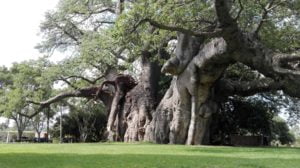
Africa’s Giant Boabab Tree
Another rather amazing observation has been that some of the longer-term trends in tree recordings seem to respond to the approach of earthquakes. NASA Ames scientist Friedemann Freund, with whom we are collaborating, has developed a theory that explains how rocks deep in the earth act as batteries when they are stressed by tectonic forces preceding earthquakes. The theory also explains how the electrical charge carriers that flow through the rocks appear to cause a response in the electrical activity of trees.
Amazingly, the tree potential changes occur well before the earthquakes actually happen. It may very well be that trees will end up playing the role of low-cost sensors that can help predict when larger earthquakes are about to occur.
With additional funding, we hope to be able to expand this line of research and set up a network of tree-monitoring sites and create a website that provides the public with live data from a grove of redwood tress with which they can try to interact energetically anytime they like.
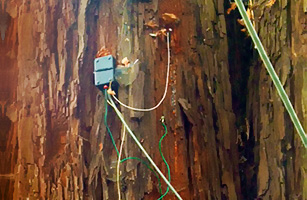
Setting sensors on trees
Electrodes attached to a Redwood tree.
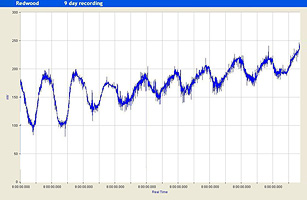
9-day reading
Electrical potentials of a Redwood tree over 9 days.
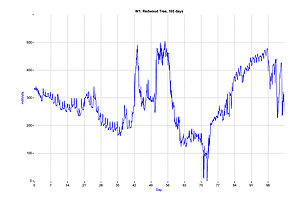
105-day activity report
Electrical potentials of a Redwood tree over 105 days.
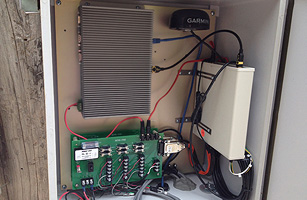
Tree sensor
High resolution data acquisition equipment used for monitoring trees.

California Redwood Forest
Source: Tree Research
Disclaimer: We at Prepare for Change (PFC) bring you information that is not offered by the mainstream news, and therefore may seem controversial. The opinions, views, statements, and/or information we present are not necessarily promoted, endorsed, espoused, or agreed to by Prepare for Change, its leadership Council, members, those who work with PFC, or those who read its content. However, they are hopefully provocative. Please use discernment! Use logical thinking, your own intuition and your own connection with Source, Spirit and Natural Laws to help you determine what is true and what is not. By sharing information and seeding dialogue, it is our goal to raise consciousness and awareness of higher truths to free us from enslavement of the matrix in this material realm.
 EN
EN FR
FR



























More reasons to hug ( or plant) a tree!
I bet birds know a thing or two about trees that we have yet to discover.